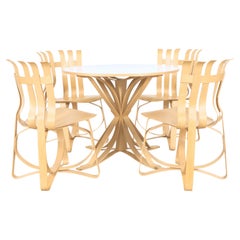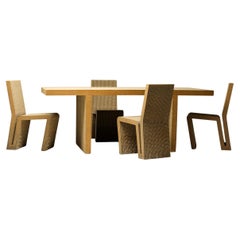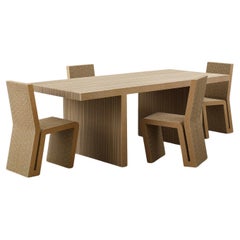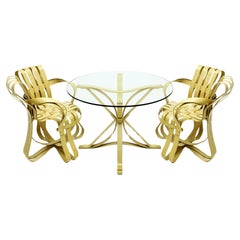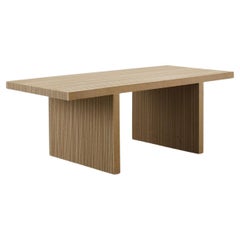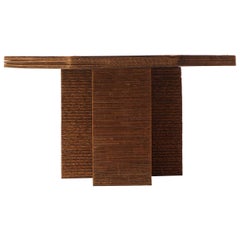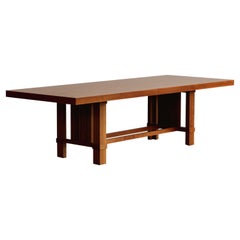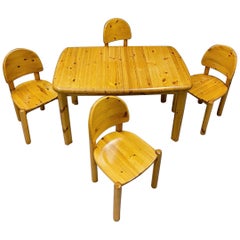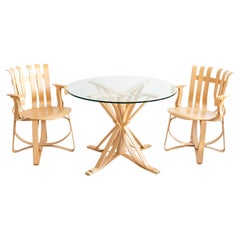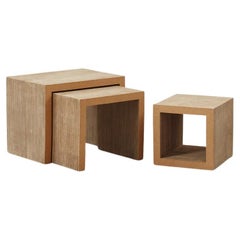Frank Gehry Tables
With magnificent buildings such as the Guggenheim Bilbao, Disney Concert Hall in Los Angeles and the new Foundation Louis Vuitton in Paris, Frank Gehry has changed the nature and spirit of contemporary architecture. Yet the world’s best-known living architect has also enjoyed a prolific career as a designer of artful and functional objects, ranging from furniture to jewelry, that even at smaller scale are as lively and captivating as his architectural designs.
Gehry was born in Toronto and moved with his family to Los Angeles in 1947. He received a degree in architecture from the University of Southern California in 1954 and — after several years of casting about that included a stint in the U.S. Army and studies at Harvard — Gehry opened his architectural practice in L.A. in 1962.
Idiosyncratic renovations to his small, traditional house in Santa Monica — such as cladding portions of the exterior in chain-link fencing and corrugated metal — drew attention to Gehry in architectural circles. Corporate and institutional commissions added to his reputation, culminating in the global acclaim that greeted the opening of the Guggenheim Bilbao in 1997. But the combination of visual dynamism and structural integrity expressed by that building had been evident for decades in Gehry’s designs. In 1972 he introduced a much-admired line of furniture he called Easy Edges. The curves and flowing lines of the pieces, which include the Wiggle chair, seem antithetical to the material are made from: cardboard — a presumably flimsy material that, when stacked, laminated and folded, is actually extraordinarily sturdy.
Many of Gehry’s designs feature an abstracted fish motif. For the architect, it is a symbol of vitality, strength and flexibility. The fish appears in a group of 1982 plastic lamps created for Formica (and exhibited by the Jewish Museum in New York in 2010). Gehry used the motif in crystal goblets for Swid Powell (1990), his Pito kettle for Alessi (1992) and as earrings for a 2006 jewelry collection for Tiffany that also includes torqued rings, necklaces and bangles.
Gehry returned to furniture design in 1992 with a remarkably energetic line of furniture for Knoll with frames and seating made of bent, lightweight wooden strops. (The pieces' names, such as Power Play and Cross Check, derive from ice hockey.) In 2004, Heller released a group of twisted, faceted furnishings in molded polyethylene meant to evoke Gehry’s architecture. But — whether its tableware, jewelry or furniture — all Gehry’s designs do that--sharing an animated aesthetic built on a solid foundational core. To possess a piece of Gehry design is to own one of his buildings, in miniature.
Find vintage Frank Gehry chairs, tables and other furniture on 1stDibs.
1990s American Mid-Century Modern Frank Gehry Tables
Bentwood, Laminate
1970s American Mid-Century Modern Vintage Frank Gehry Tables
Masonite
1970s Swiss Vintage Frank Gehry Tables
Paper
1990s American Post-Modern Frank Gehry Tables
Glass, Beech
1970s Swiss Vintage Frank Gehry Tables
Paper
1970s American Mid-Century Modern Vintage Frank Gehry Tables
Paper
20th Century American Mid-Century Modern Frank Gehry Tables
Wood, Glass, Ebony, Maple
1980s Italian Mid-Century Modern Vintage Frank Gehry Tables
Walnut
Mid-20th Century Danish Mid-Century Modern Frank Gehry Tables
Pine
1990s American Mid-Century Modern Frank Gehry Tables
Plastic, Birch, Plywood
1970s Italian Mid-Century Modern Vintage Frank Gehry Tables
Metal, Chrome
1960s American Mid-Century Modern Vintage Frank Gehry Tables
Brass
Mid-20th Century Frank Gehry Tables
Wood
1960s Danish Mid-Century Modern Vintage Frank Gehry Tables
Leather, Wood
1960s Italian Mid-Century Modern Vintage Frank Gehry Tables
Carrara Marble, Metal
1970s Italian Mid-Century Modern Vintage Frank Gehry Tables
Metal, Chrome
2010s Italian Frank Gehry Tables
Leather, Wood, Boxwood, Maple, Walnut
Mid-20th Century American Mid-Century Modern Frank Gehry Tables
Masonite, Paper
20th Century American Frank Gehry Tables
Burl
1990s American Mid-Century Modern Frank Gehry Tables
Glass, Maple
1970s Swiss Modern Vintage Frank Gehry Tables
Paper
1990s American Post-Modern Frank Gehry Tables
Wood
Late 20th Century American Modern Frank Gehry Tables
Masonite, Paper
1970s German Modern Vintage Frank Gehry Tables
Paper
Early 20th Century American Frank Gehry Tables
Glass, Maple, Bentwood
1970s American Modern Vintage Frank Gehry Tables
Paper
Late 20th Century North American Modern Frank Gehry Tables
Maple
1980s American Post-Modern Vintage Frank Gehry Tables
Other
1990s American Post-Modern Frank Gehry Tables
Glass, Maple, Plywood
1990s American Modern Frank Gehry Tables
Maple, Glass
20th Century American Frank Gehry Tables
Maple
Frank Gehry tables for sale on 1stDibs.
Creators Similar to Frank Gehry
- 1stDibs ExpertFebruary 27, 2024The name of Frank Gehry's chair depends on which piece you're referring to, as the designer has produced quite a few chairs over the course of his career. Arguably, his most famous chair is the S-shaped Wiggle chair, crafted out of corrugated cardboard. He also designed several chairs out of ribbon-like pieces of bent wood, such as the armless, low-backed Hat Trick chair, the curvy Cross Check chair and the tall High Sticking chair. On 1stDibs, find a collection of vintage Frank Gehry chairs.
- 1stDibs ExpertFebruary 27, 2024The material used in Frank Gehry's Wiggle chair is the type of corrugated cardboard that is typically reserved for making architectural models. The piece comes from Gehry's Easy Edges collection of paper furniture. Gehry was inspired to produce the Wiggle chair and the rest of his Easy Edges pieces because he believed that the seating options available to consumers when the chair debuted in 1972 were too expensive. Find a selection of vintage Frank Gehry furniture on 1stDibs.
